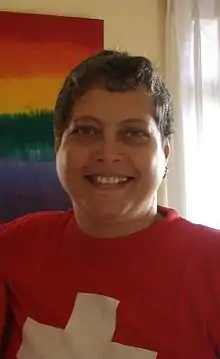 Rosanna Flamer-Caldera, LGBT activist from Sri Lanka | |
| Formation | 2004 |
|---|---|
| Founder | Rosanna Flamer-Caldera |
| Type | Non-profit |
| Purpose | Advocates for political and social rights for lesbian, gay, bisexual, transgender (LGBT), intersex and queer people |
| Headquarters | Colombo, Sri Lanka |
Equal Ground is a non-profit organization based in Colombo, Sri Lanka, that advocates for political and social rights for lesbian, gay, bisexual, transgender (LGBT), intersex and queer people. The organization, established in 2004, claims to be the first organization in Sri Lanka that welcomes people of all sexual orientations and gender identities...[1] The organization was founded by Sri Lankan gay rights activist Rosanna Flamer-Caldera and offers trilingual publications and services.[2] It aims to achieve its goals through political activism, education, personal support, building awareness and through organized community events. It has been working more closely with lesbian, bisexual and transgender women in areas of human rights, law reform, sexual health, and violence based on sexual orientation and gender identity. The organization continues to face many challenges working in Sri Lanka where homosexuality is stigmatized and considered criminal offense that can earn up to ten years of prison under the law.[3] Efforts of the LGBT activists to undo the British colonial law criminalizing sodomy was not repealed, but the law was expanded to include women and the penalty was worsened.[4] Queer groups in Sri Lanka have frequently stated that some of their members have been subjected to harassment—by blackmail or by threats with exposition or arrest—by police and other people, using the legal provision.[5]
Notable works
- Equal Ground provided disaster relief to its community and others when the 2004 tsunami hit Sri Lanka leaving many deaths and homelessness.[6]
- Colombo Pride is the only annual Pride celebration in Sri Lanka, and is organized by Equal Ground since 2005. The first ever event was attended by around 350 people. The newspaper Ceylon Today describes it as a week-long joyous celebration with a variety of events full of color, music and diversity.[7]
- Equal Ground launched its first publication "Human, Right?" in 2005 to celebrate the International Day against Homophobia (IDAHOT). The publication located LGBTQ rights within the larger framework of human rights and appealed for the importance of LGBTQ rights as a part of human rights.[8]
- Rainbow News, which is published quarterly by Equal Ground is the Sri Lanka's only LGBT publication.
- The annual South Asian Lesbian and Bisexual Women's Conference and Training was supported by Equal Ground in the years of 2010 and 2011.
- The organization launched its "I Might be Transgender: a booklet for transgender youth" at the 2014 IDAHOT conference that took place in Colombo, Sri Lanka. It also released the documentary "The Invisible Stain" at the same occasion.[9]
- Equal Ground working in collaboration with the Kaleidoscope Australia Human Rights Foundation, a group that promotes equal rights for LGBT people in Asia Pacific region, submitted an alternative human rights report on "Sri Lanka's protection of the rights of LGBTI Persons" to the United Nations Human Rights Committee in September 2014.[10]
Achievements and recognition
Following Equal Ground and Kaleidoscope Australia's 2014 shadow report on LGBT rights in Sri Lanka that was submitted to the United Nations Humans Rights Committee, the government representatives from Sri Lanka admitted to the committee for the first time that the human rights of LGBT people were protected under the country's anti-discrimination laws. LGBT rights activists and the community widely welcomed this as a small change in the positive direction.[11] In 2012 Women Deliver identified Equal Ground as one of the fifty most influential groups around the world that provides services to women. Women deliver appreciated and congratulated Equal Ground for its work towards leadership and empowerment of women.[12]
See also
References
- ↑ "EQUAL GROUND". Archived from the original on 2014-12-17. Retrieved 2014-11-14.
- ↑ "GO Magazine - Fighting for Equal Ground in Sri Lanka". 26 September 2013. Archived from the original on 2015-02-08. Retrieved 2014-11-28.
- ↑ "Sri Lanka". Archived from the original on 2008-08-20. Retrieved 2014-11-14.
- ↑ Kaushalya Perera. "12". In SASKIA E. WIERINGA (ed.). Sexualizing the State: Sodomy, Civil Liberties, and the Indian Penal Code (PDF). Archived from the original (PDF) on 2010-05-28. Retrieved 2015-01-11.
{{cite book}}:|work=ignored (help) - ↑ Joyoti Puri. Angana Chatterji; Lubna Chowdhury (eds.). "Stories to tell: A queer women's oral history in Sri Lanka" (PDF). WOMEN-LOVING-WOMENIN AFRICA AND ASIA. Zubaan Books. Archived (PDF) from the original on 2016-03-03. Retrieved 2015-01-11.
- ↑ "PrideSource - Sri Lankan gay group provides disaster relief". Pridesource. Archived from the original on 2016-03-04.
- ↑ Yashasvi Kannangara (2012-06-12). "Ceylon Today — Celebrate diversity in true Colombo Pride style". Ceylon Today. Archived from the original on 2016-03-04. Retrieved 2015-01-11.
- ↑ "Gay Sri Lanka". GlobalGayz.
- ↑ +IDAHO Admin. "IDAHOT Report 2014: Sri Lanka". IDAHOT – International Day Against Homophobia and Transphobia – May 17 -. Archived from the original on 2015-01-11.
- ↑ "GayNZ.com Sri Lanka takes anti-discrimination stride". Archived from the original on 2014-11-13. Retrieved 2014-11-14.
- ↑ "Kaleidoscope Australia welcomes the Sri Lankan government response to its ICCPR review - Kaleidoscope Australia". Archived from the original on 2016-03-03. Retrieved 2014-11-14.
- ↑ Women Deliver 2010. "Women Deliver » Knowledge Center » Women Deliver Publications » Women Deliver 50 (2012) » Leadership and Empowerment". Archived from the original on 2014-08-21.
{{cite web}}: CS1 maint: numeric names: authors list (link)